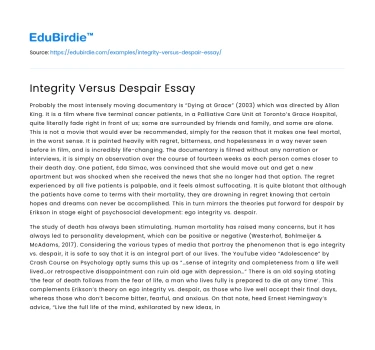Probably the most intensely moving documentary is “Dying at Grace” (2003) which was directed by Allan King. It is a film where five terminal cancer patients, in a Palliative Care Unit at Toronto’s Grace Hospital, quite literally fade right in front of us; some are surrounded by friends and family, and some are alone. This is not a movie that would ever be recommended, simply for the reason that it makes one feel mortal, in the worst sense. It is painted heavily with regret, bitterness, and hopelessness in a way never seen before in film, and is incredibly life-changing. The documentary is filmed without any narration or interviews, it is simply an observation over the course of fourteen weeks as each person comes closer to their death day. One patient, Eda Simac, was convinced that she would move out and get a new apartment but was shocked when she received the news that she no longer had that option. The regret experienced by all five patients is palpable, and it feels almost suffocating. It is quite blatant that although the patients have come to terms with their mortality, they are drowning in regret knowing that certain hopes and dreams can never be accomplished. This in turn mirrors the theories put forward for despair by Erikson in stage eight of psychosocial development: ego integrity vs. despair.
The study of death has always been stimulating. Human mortality has raised many concerns, but it has always led to personality development, which can be positive or negative (Westerhof, Bohlmeijer & McAdams, 2017). Considering the various types of media that portray the phenomenon that is ego integrity vs. despair, it is safe to say that it is an integral part of our lives. The YouTube video “Adolescence” by Crash Course on Psychology aptly sums this up as “…sense of integrity and completeness from a life well lived…or retrospective disappointment can ruin old age with depression…” There is an old saying stating ‘the fear of death follows from the fear of life, a man who lives fully is prepared to die at any time’. This complements Erikson’s theory on ego integrity vs. despair, as those who live well accept their final days, whereas those who don’t become bitter, fearful, and anxious. On that note, heed Ernest Hemingway’s advice, “Live the full life of the mind, exhilarated by new ideas, intoxicated by the romance of the unusual.”
Save your time!
We can take care of your essay
- Proper editing and formatting
- Free revision, title page, and bibliography
- Flexible prices and money-back guarantee
Did you like this example?
Make sure you submit a unique essay
Our writers will provide you with an essay sample written from scratch: any topic, any deadline, any instructions.
Cite this paper
-
APA
-
MLA
-
Harvard
-
Vancouver
Integrity Versus Despair Essay.
(2024, January 18). Edubirdie. Retrieved December 22, 2024, from https://edubirdie.com/examples/integrity-versus-despair-essay/
“Integrity Versus Despair Essay.” Edubirdie, 18 Jan. 2024, edubirdie.com/examples/integrity-versus-despair-essay/
Integrity Versus Despair Essay. [online].
Available at: <https://edubirdie.com/examples/integrity-versus-despair-essay/> [Accessed 22 Dec. 2024].
Integrity Versus Despair Essay [Internet]. Edubirdie.
2024 Jan 18 [cited 2024 Dec 22].
Available from: https://edubirdie.com/examples/integrity-versus-despair-essay/
copy






 Stuck on your essay?
Stuck on your essay?

